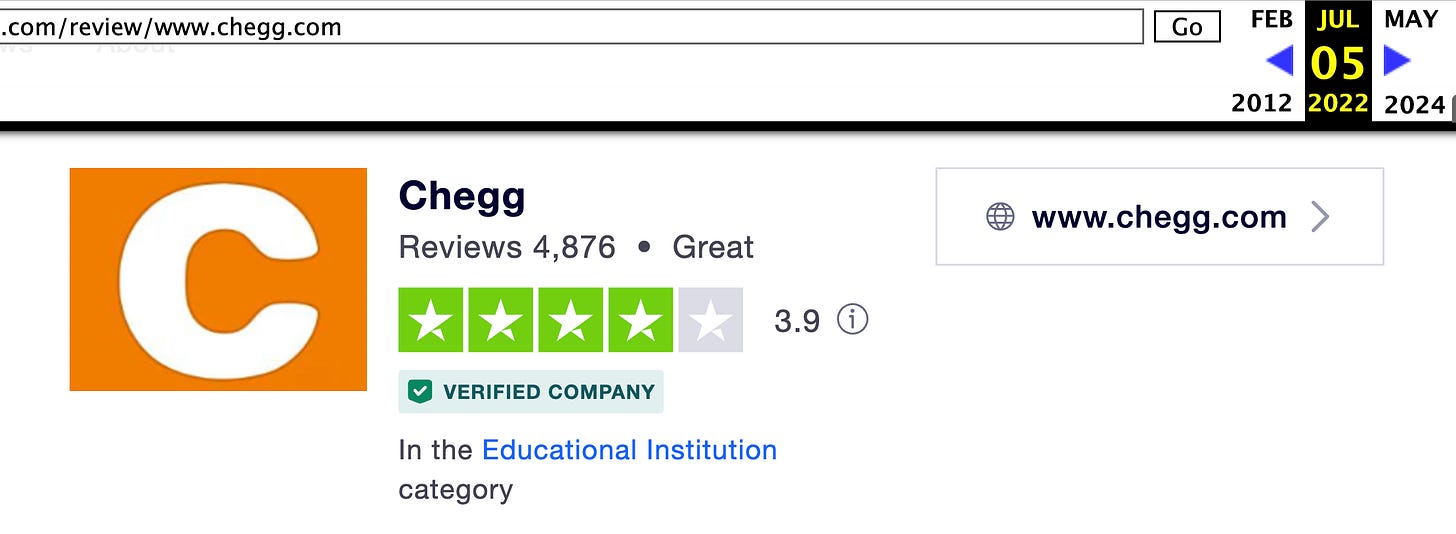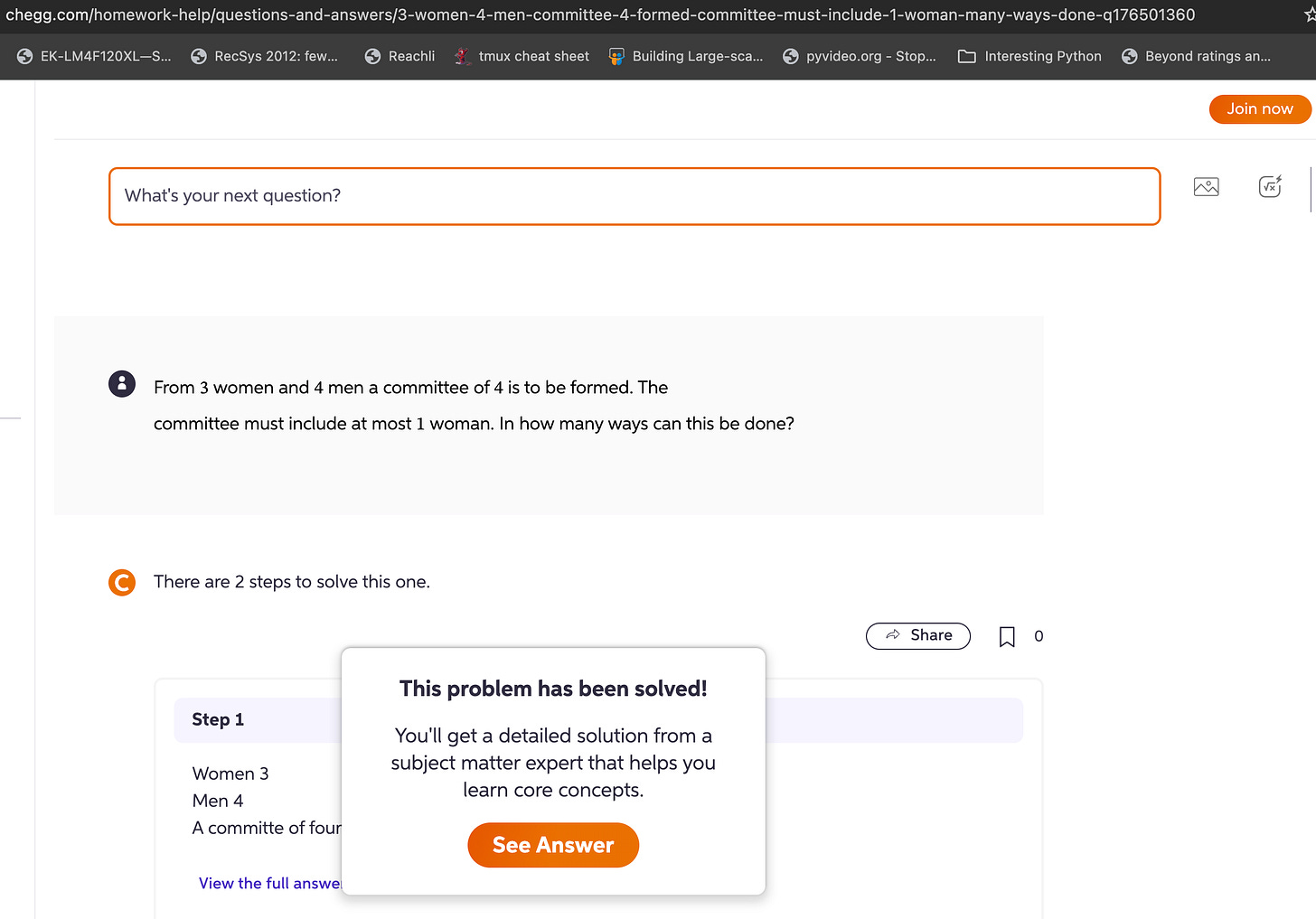Chegg vs. Duolingo: Lessons to learn when confronting AI disruption risk
Chegg's struggles and Duolingo's strategic approach
Chegg and Duolingo: A tale of two Gen AI strategies
Over the past year, Chegg's stock has tumbled nearly 80%, while Duolingo's has surged by 63%. Both companies operate in the education sector, offering subscription-based services, but their stocks have diverged sharply due generative AI. Despite Chegg’s recent efforts to change the market narrative, its struggles reveal issues related to its Gen AI strategy. Meanwhile, Duolingo’s measured approach offers valuable insights for building robust and defensible AI products.
The beginning of the end of Chegg
Chegg, originally a textbook rental service, successfully transitioned into a platform for homework help and tutoring. However, the rise of generative AI tools like ChatGPT has raised serious issues with its product offering and strategy.
Chegg faces three key issues related to Generative AI:
Chegg’s tutoring value proposition lies along LLM providers path to get better
Chegg’s attempts to use AI to reduce costs lowered product quality
Chegg’s SEO strategy is inherently vulnerable
Sam Altman unintentionally steamrolled Chegg
Chegg’s troubles start with issues beyond it’s control. Foundational models use academic literature and tests to both train and benchmark their results. This creates a major issue for Chegg.
In a 2023 paper1 published by Microsoft, researchers found that the quality of foundational models could be significantly improved by training them on textbooks. This suggests that the academic content Chegg uses as a core part of its service is becoming freely available within AI models.
Tests like the SAT, GRE, and GMAT are also used to benchmark and compare models. In addition to getting better model output with higher quality, textbook data, the models are also specifically training on the same tests that Chegg’s users are studying for.
When GPT-4 came out, OpenAI’s announcement2 included this table comparing GPT-4 to GPT-3.5’s performance on college tests.
Chegg’s core service—providing academic help—is directly threatened by these AI models. And model providers are giving away these academic benefits, to users, who may not need to pay for it. As a result, the educational content that once gave Chegg a competitive edge is now widely accessible for free, diminishing the need for Chegg’s paid services.
Lower costs, but worse product quality
Chegg attempted to counter this threat by introducing introducing AI features and using AI to reduce costs. As an example, in February of 2024, during the Q4 2023 (Fiscal Year) earnings call, Dan Rosenweig, the then CEO said,
The cost to answer a new question using our own AI models is already more than 75% less expensive, and we believe it will continue to decline over time.
This was brought up again by the new CEO in the most recent (August 2024) earnings call.
Today, we produce solutions at a 75% reduction per unit versus human creation alone. The bottom line is that we are now creating more content of higher quality, at lower cost. And as you know, content is the primary driver of our acquisition flywheel.
An issue is that students are skeptical of the answers and its hurting product quality. Looking at Trustpilot reviews of Chegg in 2022 versus today, there is a clear decline in product satisfaction.
Using Archive.org we can see Chegg’s ratings at 3.9 stars in July of 2022.
Compared to todays3 ratings of of 2.6.
The average rating of the product has quantitatively dropped, and the marginal rating would be even worse. Qualitatively, Reddit (never a balanced source), had a post that echoed concerns about product quality:
Chegg is awful since the AI update. Any alternatives?
Instead of how it use to be in the past. With experts answering questions and giving proper explanations to help study. Instead now you pay for a service that gives you wrong answers and is just written by AI who doesn’t know anything math related for the most part. Can’t even use it as a study tool anymore. Anyone have a site recommendations where one could submit questions?4
Hallucinations are a known issue with LLMs. Academic works have right and wrong answers. Paying for a service that provides wrong answers is going to product unhappy customers.
Moreover, the inherent issue of AI hallucinations—where LLMs generate incorrect or misleading information—poses a much greater risk in the context of test preparation than in language learning. For students relying on accurate answers for exams, even a small error can have significant consequences. This makes LLMs a risky choice for academic support, further complicating Chegg’s ability to compete in this space.
Chegg’s SEO strategy is highly vulnerable to AI
As mentioned in the referenced earnings call, Chegg uses content for customer acquisition (SEO) purposes. Chegg’s marketing approach is vulnerable to AI, leading to a reduction in overall user traffic. The below graphic shows Chegg’s organic traffic by month from July 2022 through July 2024, notice the decline.
A key reasons is how Chegg’s product works, and then how Chegg drives traffic from the product. Chegg users question and answer pages for SEO purposes, as highlighted from the Similarweb page screenshot of Chegg’s SEO below (read the URL to see the questions-and-answers).
Chegg then creates SEO pages like the one below. It uses the question to determine which page to generate, and populates the page with the answer.
Chegg isn’t the only one able to do this, though. Doing a search the same terms on Google shows a number of other sites copying Chegg’s SEO strategy. AI makes copying SEO tactics even easier. All of this stands in contrast with Duolingo’s approach to Gen AI.
Duolingo’s Strategic AI Approach
Duolingo’s success can be attributed to a more strategic and cautious approach to AI integration. Its thoughtful deployment of AI has strengthened its product offering and financial performance.
Monetizing AI as a Premium Feature
Duolingo’s introduction of AI-powered features through its premium subscription, Duolingo Max, illustrates how to effectively monetize AI. Unlike Chegg, Duolingo positioned AI as a value-added service rather than a cost-saving tool. Duolingo has a three tiered pricing strategy of Free, Super, and Max (they also have a Family subscription plan). The Gen AI features are put into Max.
Duolingo Max provides two Gen AI features:
Roleplay - users can roleplay a scenario in Spanish or French and have a chat experience.
Explain my answers - Gen AI can explain what is wrong about in answer (in Spanish or French) and how to correct it.
Gating Gen AI in the priciest tier gives a small percentage of less price sensitive users a reason to upgrade, and helps Duolingo control its Gen AI costs. At the same time, Max currently only available to only 15% of its users5, and in a small set of languages. Looking through reviews, users that leave reviews are concerned about the cost, further reducing usage. The benefit is that Duolingo has time to perfect the AI features, reducing the chance of lower product quality, like Chegg experience. As costs come down, lower tier subscription plans can get AI access.
Managing AI Hallucinations and User Trust
While hallucinations in AI can be a significant issue for any application, Duolingo’s use of AI in language learning presents a lower risk than Chegg’s use of AI for academic support. Errors in language practice are generally less consequential than errors in test preparation, where precision is critical. This difference in context has allowed Duolingo to integrate AI with less risk of damaging user trust.
Selective AI Deployment and Revenue Growth
Duolingo has been careful to integrate AI only where it can make the most significant impact. This selective approach has allowed the company to gradually enhance its product without alienating users or compromising on quality. While this hasn’t led to a significant increase in engagement or revenue, it has improved the overall user experience and driven revenue growth.
Moreover, Duolingo’s careful AI strategy has been rewarded by the stock market, with its share price rising by 63% over the past year. This increase reflects investor confidence in Duolingo’s ability to navigate the AI landscape effectively and sustainably.
Key takeaway: use Gen AI to enhance the product
This is a straight forward takeaway. When looking at how to use Generative AI in a product, do it in a way that enhances the product quality. Lowering costs should be a second order effect. Otherwise, one risks combining the normal issues of a product with the issues with LLMs. This degrades the user experience and reduces the product value. When this is combined with low cost, or free, alternatives to get the same value, the business will face challenges.
In contrast, Duolingo’s progress shows the benefit of a selective, premium-focused approach to AI integration. By carefully managing the risks associated with AI, particularly the issue of hallucinations, and focusing on monetizable, value-added features, Duolingo has been able to drive both revenue growth and market confidence.
For companies navigating AI integration, the lessons from Chegg and Duolingo are clear: AI should be used to enhance the user experience and create sustainable value, with careful consideration of how AI models might leverage core data. Those who align their AI strategy with their business goals and user needs, as Duolingo has done, are likely to see stronger financial performance and positive market reception.
Conclusion
The divergent paths of Chegg and Duolingo illustrate the profound impact that AI strategy can have on business outcomes. Chegg’s experience shows that maintaining engagement is not enough to counteract a weakened value proposition, especially when foundational AI models can freely access and utilize the same data that once provided a competitive edge. Meanwhile, Duolingo’s approach demonstrates that a thoughtful, user-focused AI strategy can drive both revenue growth and market confidence, even without dramatic increases in user engagement. As AI continues to reshape industries, these lessons are critical for companies looking to build defensible, successful AI-driven products.
https://arxiv.org/abs/2306.11644
https://openai.com/index/gpt-4/
Screenshot taken August 18th 2024
https://www.reddit.com/r/CollegeRant/comments/1bnpef0/chegg_is_awful_since_the_ai_update_any/
https://www.fool.com/earnings/call-transcripts/2024/08/07/duolingo-duol-q2-2024-earnings-call-transcript/











